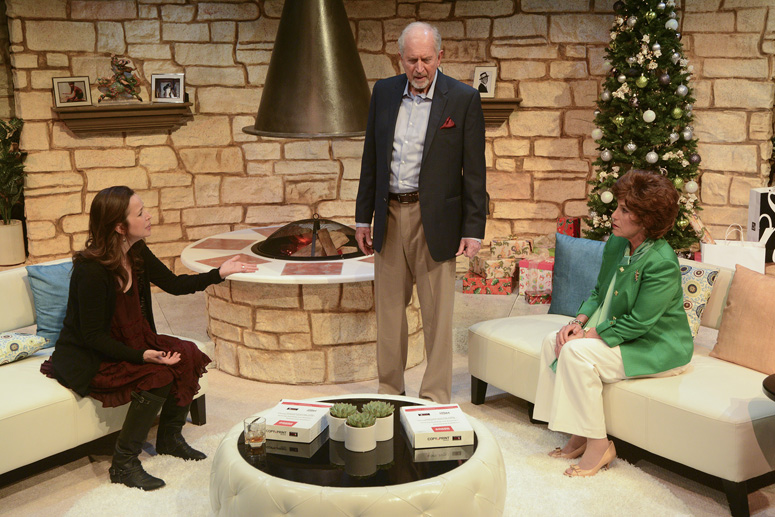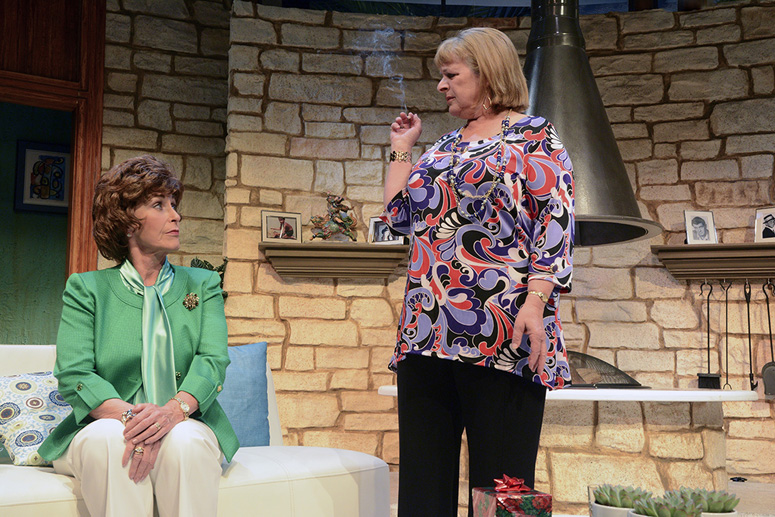
Michelle Duffy, Granville Van Dusen, and Amanda McBroom in Jon Robin Baitz's Other Desert Cities at the Rubicon Theatre.
Searching for truth in the American desert.
Searching for truth in the American desert.
Review
Ventura, CA - For those locals who follow American theatre, it was great good news when the Rubicon announced it was going to produce Other Desert Cities this season. This is a great play.
A fabulously funny, yet serious play. It was a sensation when it opened off-Broadway at the Lincoln Center Theatre and then later re-opened on Broadway in November 2011. And the Rubicon theatre company has delivered a top-notch, not-to-miss production that gives this play everything it deserves.
The Rubicon production is solid from top to bottom with a stupendous set and strong work across the board.

Michelle Duffy and Trey Ellett in Robin Baitz's Other Desert Cities at the Rubicon Theatre.
Rising stars in the Rubicon orbit.
It is another triumph for Director Brian McDonald who has already won Ventura’s Mayor’s Award for Emerging Artist and garnered a tour do force success in last season’s The Sunset Limited, proving once again that the Rubicon is a major showcase for emerging top directorial talent. Other Desert Cities is a more mature achievement, signifying a major step forward in a very promising career.
One of the strengths of the Rubicon production is the outstanding, solid performances it gets from the supporting parts in Deborah Taylor’s Silda and Trey Ellett’s Trip Wyeth.
But then, there are no small parts in Other Desert Cities. One of the keys to the play’s success is how Baitz has created five powerful characters, each living a different truth, with no one having all the facts.Resolution rests in resolving these truths with all the facts.
Though this play has serious themes and intent, Baitz is at heart a comic writer with a cutting, yet benevolent wit. In Other Desert Cities, he has created a psychological juggernaut seething with comic genius and five multidimensional, juicy parts, each one chock full of great lines--the kind of parts great actors like to seize and run with for all their worth. And in Rubicon’s Desert Cities, they do just that.
For long stretches the stage crackles with energy and wit, the audience loving every move and countermove. It is not easy to keep modern audiences laughing for five, let alone ten minutes at a stretch, but this play and this cast make it look easy.
The play is set on Christmas eve, 2004, in the Palm Springs lair the elder Wyeths have retired to. It is a reunion of sorts, as their daughter, Brooke Wyeth, returns from back East with her new “novel” in hand, and her younger brother, Trip Wyeth, has taken time off from his lucrative TV writing and production career in Los Angeles to spend Christmas with the family.
The Wyeths are no ordinary American family. At their center, stands Polly Wyeth--played pitch perfect by Amanda McBroom--who goes way beyond any stereotypical Jewish mother. Polly Wyeth has all the warmth of Trotsky’s armored train rolling through a devastated Russian countryside.

Amanda McBroom and Deborah Taylor in Robin Baitz's Other Desert Cities at the Rubicon Theatre.
Seething emnities inside a comic juggernaut.
One of her casualties is her liberal sister, Aunt Silda, by this point a recovering alcoholic, stalking the proceedings, always looking for a chance to throw a left hook her sister’s way, lobbing hilarious and acerbic jibes into the fray from the sidelines at every opportunity.
The other casualty is Polly’s daughter, Brooke Wyeth, though she is no push-over. In spite of her recent shortfalls, hesitations, and self-doubt, she has no qualms attempting to ally the rest of the family against her mother.
Everyone thinks Brooke has finally pulled through her writer’s block and finished her second novel. Then there are, it seems, complications, certain publishing arrangements have already been made, it’s not so simple …
Brooke is played brilliantly with tremendous dramatic range by Michelle Duffy in her debut on the Rubicon stage, having just returned from three years in New York city herself. She is particularly good with emotional transitions, and the psychological push and pull demanded by her character’s long journey through Christmas 2004.
On the page, the obvious read for Brooke’s part is more hardened and brittle, while Duffy and her director have her softer and stronger, to the point that when her brother says, in several places, that she is so hard, we are not quite able to believe him. But it works, for this angle on things also allows for greater emotional range, suited to Duffy’s considerable skills. In the end she has to pull off a very fast and profound emotional transition between the penultimate scene and the epilogue, and Duffy pulls this off marvelously.
As for the men in this play, they are fighting for some sort of truce, some habitable middle ground between their women, hesitant to take sides as the battles rage around them.
Polly’s husband, Lyman, is a retired A-list film lead-actor, veteran of a long list of Westerns, procedurals, and other heroic parts possessing clear-cut moral bearings and the kind of upstanding demeanor highly valued in his present position as a spokesman for the Grand Old Party and its increasingly right-leaning ambitions. For Lyman and Polly, the Reagans, as in President Reagan, are cosily “Ronnie” and “dear Nancy.”
As written, Lyman’s part is a deceptively difficult one, but Rubicon’s veteran Granville Van Dusen handles it masterfully. First off, it is the part of an actor playing an actor, always a tricky proposition on stage. But, above that, the part demands a very particular brand of emotional ambivalence, one of the most difficult things to portray in live theatre, as Lyman negotiates a very stormy set of relationships between the women in his life.The truth is, the women in his life are at war with each other. But like many great actors, he just wants to be liked and loved by everyone, especially the women in his life.
On top of this Lyman has another motive driving his ambivalence ever deeper: Lyman Wyeth is sitting on top of a secret capable of calling everything in his life, from his political affiliations to his relationships, into question; he is a man with a big secret that is eating him alive.
Baitz’s sympathies seem to lie closest to the youngest son, Trip, who also echoes some aspects of Baitz’s own writing career, who pleads throughout the first act for everyone to please, please accept their differences, get along with each other and live life, or at the very least, get through Christmas.
At core, that is Baitz’s real theme as well. Yes, he is serious and he and his characters are aware that there are real issues and differences out there, that young men, and women and innocent children die every day in other desert cities, on the other side of the globe and that what we do here in our America does make a difference.
Ultimately, as Baitz says in the play, in the hour of our death we don’t care about the politics, we care about who we have loved, that it is crucial that we all learn to accept our differences as real differences and learn to live with each other and enjoy life. And as for Americans, we do need to learn to get along better, for we all have far worse, and more dangerous enemies out there than each other.
In the end, Baitz stays true to his comic roots; he is a man who believes in happy and satisfying endings.
This is great American theatre at its best. The Rubicon has proved once again that you don’t have to take a trip to Chicago or New York, or even August Wilson’s once home, Seattle, to see first-rate theatre.It’s right here in our backyard.
We also have ample evidence in this production of why the original New York production ran for more than 260 performances and was nominated for no less than five Tony Awards.
It is also a play that rewards multiple viewings, as once you have experienced where it is going, there are things you can see in the opening scenes that the play’s script does not allow you to see first time around. You can see more clearly how masterful a construction it is and what the acting really has to achieve. So go see this play, not once, but two or three times. Or if you only see only one play this season, make sure that this is the one.
----
Other Desert Cities written by Jon Robin Baitz and directed by Brian McDonald, featuring Michelle Duffy, Trey Ellett, Amanda McBroom, Deborah Taylor, Granville Van Dusen / Hugh A. Rose at the Rubicon Theatre in Ventura, California’s downtown cultural district in old downtown at 1006 East Main Street, Ventura, California.
Other Desert Cities opened 30 May and runs through Sunday 21 June 2015, Wednesday through Sunday with matinees on Wednesday, Saturday, and Sunday. Tickets still available from the box office at 805.667.2900. www.rubicontheatre.org. Group discounts available.
photo credits: all photos Christopher Brown courtesy of the Rubicon Theatre Company

